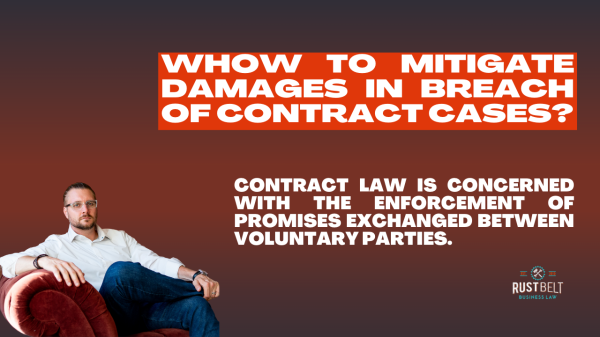How to Mitigate Damages in Breach of Contract Cases?
Fundamentally, contract law is concerned with the enforcement of promises exchanged between voluntary parties. A contractual agreement is really an exchange of promises, or duties, and those promises carry obligations which, if unmet, may lead to repercussions. If a party executes a contract with another party, and then fails to meet his or her obligations, that party will "breach" the contract, which essentially means that a violation has occurred. Whenever a breach occurs, the primary goal is to repair the impact of the breach as much as possible. In practical terms, this usually means returning the non-breaching party to a point of "wholeness," so that the non-breaching party's damages are accounted for.
Many laypeople assume that a breach of contract may provide an opportunity for a "windfall," or a chance to potentially have a superior position than they otherwise would've been able to achieve. As a general matter, however, a breach isn't an opportunity for a gain, but instead something which needs to be patched up to make the non-breaching party whole. One legal theory which prevents non-breaching parties from achieving a windfall is "mitigation of damages." Let's look carefully at this concept and discuss why businesspeople should be aware of it.
The Doctrine of "Mitigation of Damages"
Consider the following scenario: a landlord executes a lease agreement with a new tenant. The lease includes a provision on early termination: if a tenant terminates the lease prematurely, then the landlord may potentially collect the entire balance owed on the lease if another tenant cannot be obtained. This particular tenant stays for several months and then terminates the lease early. The tenant vacates the premises, and acquires a new lease elsewhere. Let's further suppose that, after the termination, the landlord makes absolutely zero efforts to acquire a replacement tenant. The landlord fails to do the normal things involved with acquiring a new tenant: advertising the unit, providing tours to interested parties, and so forth. When the landlord ultimately ends up demanding the full balance on the lease from the previous tenant, because of a failure to obtain a replacement, the court would almost certainly invoke the doctrine of mitigation of damages.
Critical Lesson: Non-Breaching Parties Cannot Remain Idle
The thing which our readers should take from this theory is the following: even if you're the non-breaching party, you cannot simply sit on your hands and expect to just collect the maximum possible amount from the breaching party. This is true despite the fact that the non-breaching party may have done essentially nothing to create the problem. The reason is because the law seeks the most reasonable outcomes, and simply allowing a party to recover without making any efforts to mitigate the effects of the breach wouldn't be too reasonable. Non-breaching parties have an affirmative duty to take action and do what they can to mitigate the impact of a breach.
In the hypothetical scenario we gave, the landlord would need to make diligent efforts to rent out the vacant unit in order to potentially have a full recovery of the contractual amount. If the landlord fails to do so, a judge will almost certainly apply the theory of mitigation of damages and prevent the landlord from recovering his or her full balance.
Contact Rust Belt Business Law for Additional Information
There is more to know about mitigation of damages, but this should serve as a good introduction. Businesspeople in particular need to know the basics of this theory, because there may be instances in which they need to act affirmatively to lessen the effects of a breach. If you want to learn more, reach out to one of the top business law attorneys at Rust Belt Business Law today by calling 814-983-6061.




